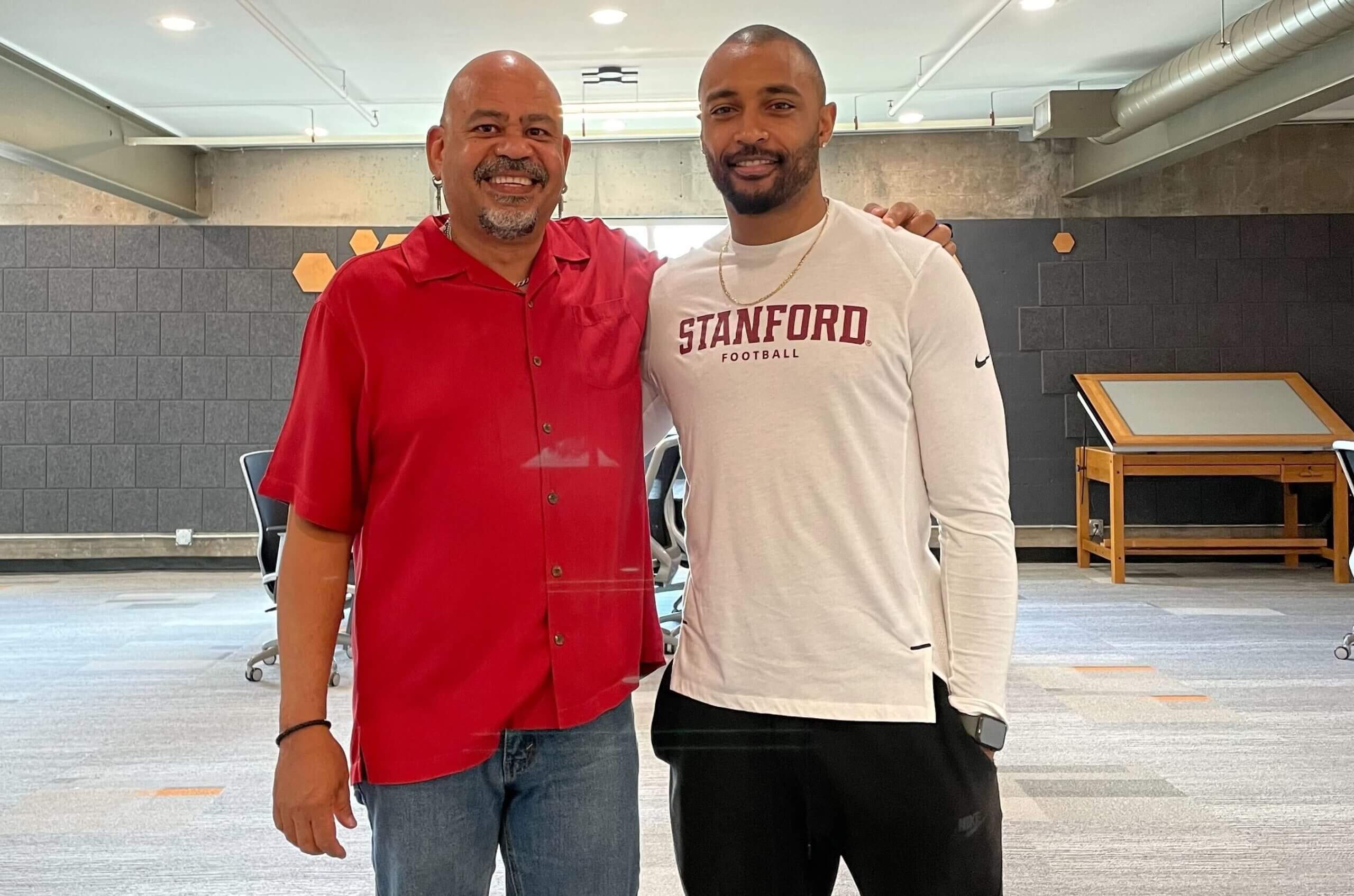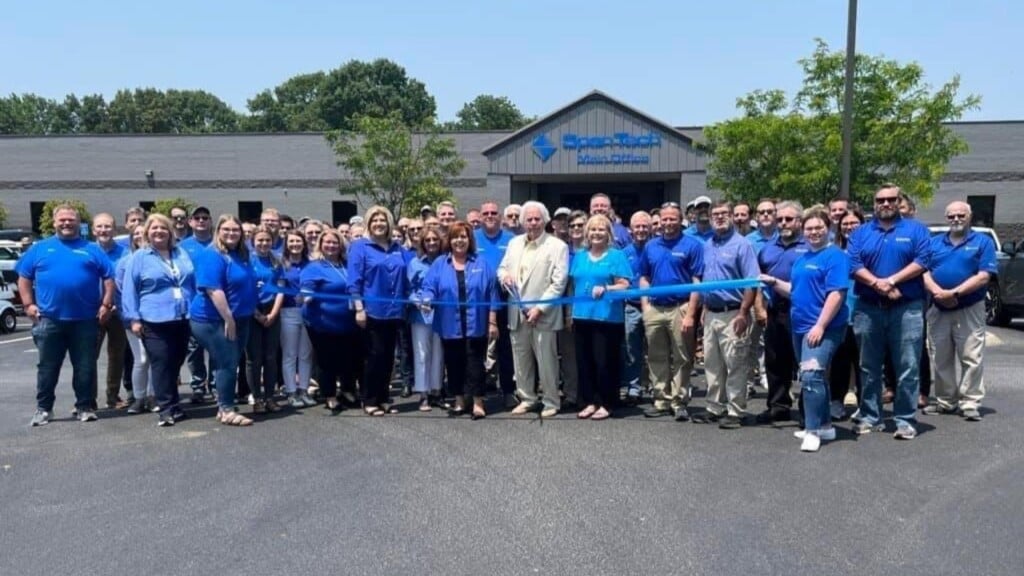[ad_1]
Doug Baldwin’s retirement from football three years ago was, in a way, a declaration that he was done fighting. A statement that it was time to step away and begin searching.
Baldwin, a former Seahawks receiver, doesn’t want that title to define his existence. Because without the helmet and pads, without the touchdown catches, the accolades, the money, the adulation from the fans, Baldwin is just a man. A husband. A father. A brother. A business partner. A friend. He’s also flawed, just like everyone else.
So, in his transition away from football, Baldwin embarked on a mission to discover who he was outside of the game. And if he were to choose a secondary career, it would have to be in a space in which he was seen for who he truly was, flaws and all.
Baldwin is currently in this space — and thriving.
He’s in the tech industry now. What began as a senior adviser role in 2019 at Intellectual Ventures, a private equity company headquartered in Bellevue, Wash., has since led to Baldwin creating and serving as the CEO of Vault 89 Ventures, a “human-centered investment company” based in Renton (Baldwin wore No. 89 for the Seahawks). Baldwin is also the CEO of Ventrk, a health-and-lifestyle-focused software company that as of last month has officially spun out from Intellectual Ventures. Ventrk’s premier product is TheraCentric, a physical therapy platform that aims to increase patient engagement via home exercise programs.
Still is. But I see you trying to get on my good side 😏 https://t.co/7yIR2rOINb
— Doug Baldwin Jr 🌹 (@DougBaldwinJr) June 24, 2022
Baldwin, 33, has a degree in science, technology and society from Stanford, so it’s not surprising he has entered this space full-time now that he’s done with football (Baldwin had also started investing in companies before his retirement, so that world isn’t entirely foreign to him, either). But much like his matriculation at Stanford and his decision to sign with the Seahawks as an undrafted rookie free agent, Baldwin’s entry into the tech world was the result of a recruitment.
Jerome Hewlett, then the head of business development at Intellectual Ventures, had been following Baldwin from afar. He saw not only a football player but a Stanford graduate with a high-level understanding of the game’s nuances and the process to be excellent at his craft. Hewlett was impressed with Baldwin’s interviews, during which he showcased selflessness and emphasis on being part of a team.
“Every single time he spoke, it was about the team, it was about the culture,” said Hewlett, now the chief commercial officer at Mangata Networks. “It was never about him — it was about everything else. When you listen to really good people who are good in their profession, especially in the business world, it’s never about themselves, it’s about the group of people they’ve assembled and how that individual is able to get them to work together to a common goal. That was Doug on the field. I thought it would translate into business.”
Intellectual Ventures at the time was in the process of creating companies that revolved around sports performance and physical therapy, two areas that were right in Baldwin’s wheelhouse, both from a preventative and recovery lens. One reason Baldwin chose to leave football was the physical toll it took on his body. Hewlett reached out shortly after Baldwin’s retirement in 2019 with a long-term plan of having Baldwin eventually becoming CEO of a physical-therapy-focused spinout company. TheraCentric was the company he had in mind. But Hewlett knew he had to slow-play the idea by bringing Baldwin along as an adviser and letting him get a feel for the business world. Baldwin’s curiosity would take over from there. Less than two years later, Baldwin was running the show.
“It was a one and a half year trap I put into play to get him to become CEO,” Hewlett said with a laugh.
But that plan wouldn’t work unless Hewlett genuinely valued Baldwin as an individual, independent of his football career. Hewlett communicated this to Baldwin from the beginning.
“I’m not a Seahawk fan,” he told him, “so I don’t give two shits about that you used to play, that you know people.”
For Hewlett, Baldwin’s Stanford background, team-oriented mindset and emphasis on establishing a healthy work culture were more important qualities.
“He felt like there was something there,” Baldwin said. “He whipped out the red carpet for me, man. Really took care of me. Wanted to show me that he saw me as a human being, not as a football player. Not as an entertainer, just as a human being.”

Jerome Hewlett, left, thought Doug Baldwin’s attitude and leadership skills would translate in the business world. (Courtesy of Hewlett)
Baldwin craved to be seen in this way. He needed to be seen in this way. Three days after announcing his retirement, Baldwin became a father. Not only was his own life in transition, Baldwin and his wife, Tara, were now responsible for the life of their newborn daughter. Baldwin was reluctant to jump into anything new straight out of football because he didn’t trust that anyone had the right intentions for him. “It was a really, really hard transition,” he said. On the path to finding himself, Hewlett’s words made Baldwin feel comfortable, made him feel safe. And made him feel good about accepting Hewlett’s offer.
“I was just like, ‘This guy really sees me,’” Baldwin said. “He has confidence I can go into this other realm and do something really well. That’s what I really want. I want to validate for myself that I’m not just a football player. He gave me that opportunity.”
Another essential figure in this regard was Kimi Lee King, Vault 89’s chief operating officer. She met Baldwin 10 years ago while serving as the health and wellness director at a local YMCA. The two stayed in contact, King regularly helping Baldwin with his speaking engagements. They always knew they’d work together in a more official capacity; they just weren’t sure how it would look. Then came Baldwin’s retirement and the opportunity to build a company together.
“Since the beginning, his career was secondary to who he was as a human,” King said. “I told him going into this, ‘I’m supporting you as a human. I don’t know what I’m getting into. I have two children to raise and take care of so I’m taking a huge risk by doing this but I’m doing it because I believe in you as a human being, and I want to support you.’”
“She’s family to me,” Baldwin said.
King’s honesty is valued. Baldwin doesn’t want or need people around him who merely tell him what he wants to hear. King keeps it real with him, in good times and in bad. If Baldwin is excited about an idea, King will run through a list of questions to filter out if it makes sense, fits their objectives and serves their purpose.
“It’s those very honest, raw conversations that has taken 10 years of building trust,” she said.
“She also calls me out on my bullshit, which is definitely needed in this space,” Baldwin said, noting that such a level of accountability was missing from his final seasons in the NFL. As Baldwin grew into one of the oldest, richest and most accomplished players on Seattle’s roster, there were fewer people willing to shoot it straight with him.
“That was hard for me because it’s not what I wanted; I wanted people to stay on me and continue to push me,” Baldwin said. King’s honesty was even more refreshing in that context. “I was honored by it.”

Kimi Lee King and Baldwin knew they always wanted to work together in an official capacity. (Courtesy of King)
Baldwin has always used his platform to show his interests outside of football. He was a member of the Players Coalition, which works with professional players, coaches and owners to improve social justice and racial equality, and was an advocate for bail reform. He wrote a letter with NFL commissioner Roger Goodell to the Senate Judiciary Committee endorsing the Sentencing Reform and Corrections Act of 2017, supported a local police de-escalation bill in 2018 and was heavily involved in the Seahawks Players Equality & Justice for All Action Fund. Baldwin has also always found pleasure in servicing others by being able to build. He collaborated with a young girl to build a park in Mabton, Wash., and is in the process of constructing the Family First Community Center in Renton.
“I’m a builder. I’m a creator,” Baldwin said. “I’m competitive with it. Business gives me that opportunity to be creative.”
But he and King aren’t just building to build. Nor are they creating ideas merely for the sake of having them. They want their business to operate with a purpose.
“When we sat and went through our branding strategy, so much is we just want every human to feel seen and valued and heard, and feel like they belong,” King said. “If we can make a dent and do something in that space to where someone feels that, then we’re doing something right.”
Baldwin insists he’s not motivated by money. He also recognizes his privilege in being able to say that (his career earnings exceed $41 million, according to Over the Cap). He’s fueled by the desire to serve others. Building products such as TheraCentric allows him to tap into another passion: How technology impacts society and how it can be used to solve problems.
During a podcast appearance in November, Baldwin was asked what goes into being an excellent route-runner. He started with a one-word reply: “Empathy.” An odd response, yes, but also a revealing one. Whether in football or in business, empathy is at the core of what Baldwin does, who Baldwin is. Ventrk is no different.
“That’s one of the things I love about what we do,” Baldwin said. “We build things with an empathetic lens. We can go through an experience and say, ‘How can this experience be better? How can it be accessible to more people?’ If we have a solution to that, I’m all for that.”
For example, the goal of TheraCentric is to service those who need physical therapy but may not be able to make it to a clinic. Patients can have their progress tracked and engage directly with a physical therapist about their exercise and ways to improve. This increases the likelihood patients actually follow through with their physical therapy.
Ventrk’s other product is TrainCentric, also focused on physical health. It’s an exercise training app that allows personal trainers — many of whom post their content primarily on social media platforms — to upload detailed exercises for their subscribers to follow. This offers a more efficient path to monetization than, say, trainers posting workouts on Instagram or TikTok, Baldwin said. With both products, the thought process is the same: Baldwin and his team put themselves in the shoes of the consumer, service a growing number of people interested in health and wellness apps and activities and make a difference in their lives.
“Genuine health and well-being, making a positive impact on peoples’ lives,” Baldwin said. “That’s what I want to do.”
Baldwin feels this is his calling. This is who he is: a servant. As products like TheraCentric grow and Vault 89 continues to build and develop more solutions to societal problems, Baldwin believes that so long as love and empathy are at the forefront of their minds when doing business, their companies will continue to be successful.
“My approach is I want to take care of my people,” Baldwin said.
Baldwin let out a laugh when asked if he misses football. He doesn’t. Not the physical part, at least.
He’s not totally detached from the game. Baldwin raised the 12 Flag at Seattle’s home opener last season. He trained with Washington Commanders receiver Terry McLaurin (the two share an agent). He appeared on a pair of Seahawks podcasts in the last year. Baldwin still shoots hoops with his former teammates and, in collaboration with ex-defensive linemen Michael Bennett and Cliff Avril, just hosted a celebrity basketball game at Climate Pledge Arena through their fundraising coalition, Champions of Change. Baldwin will forever be linked to the Seahawks, and to the game of football. But that part of his life is largely in the past.
“I miss the camaraderie,” Baldwin said. “I miss the locker room.”

Wide receiver Doug Baldwin played for the Seahawks from 2011 to 2018. (Kirby Lee / USA Today)
Instead of a locker room inside the Virginia Mason Athletic Center, he has an office space in downtown Renton. Instead of film sessions with the Seahawks, Baldwin brainstorms with King and their team at Vault 89. No more pushing the ball downfield trying to outperform the competition. Baldwin’s new team is pushing TheraCentric to outperform products from other companies.
“I’m in a space where I still get to compete at a high level,” Baldwin said. “I get to be part of a team, build teams and compete — without the threat of physical violence. I don’t miss that part. I do miss the camaraderie in the locker room and my boys, my brothers. Other than that, I’m in a good place.”
And in this place, Baldwin knows exactly who he is.
(Top photo: David Ryder / Bloomberg via Getty Images)
[ad_2]
Source link


